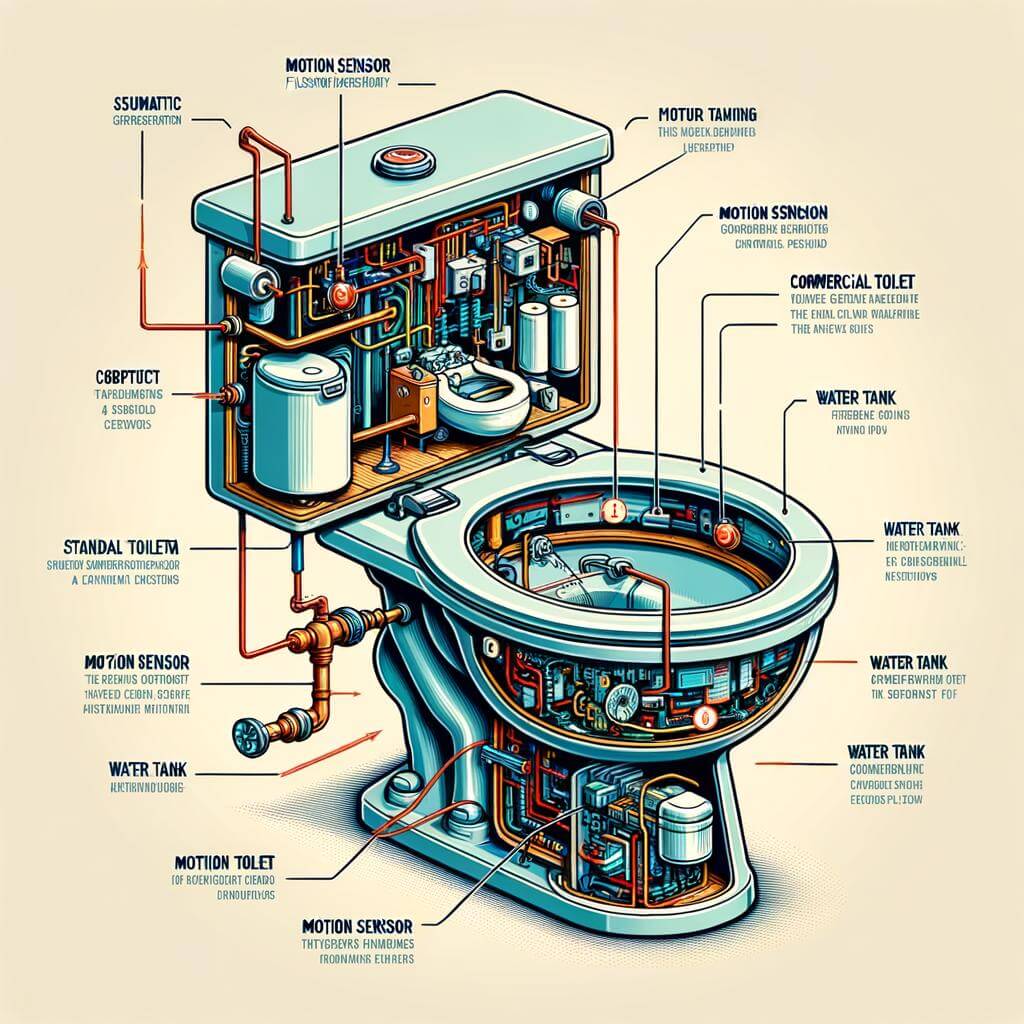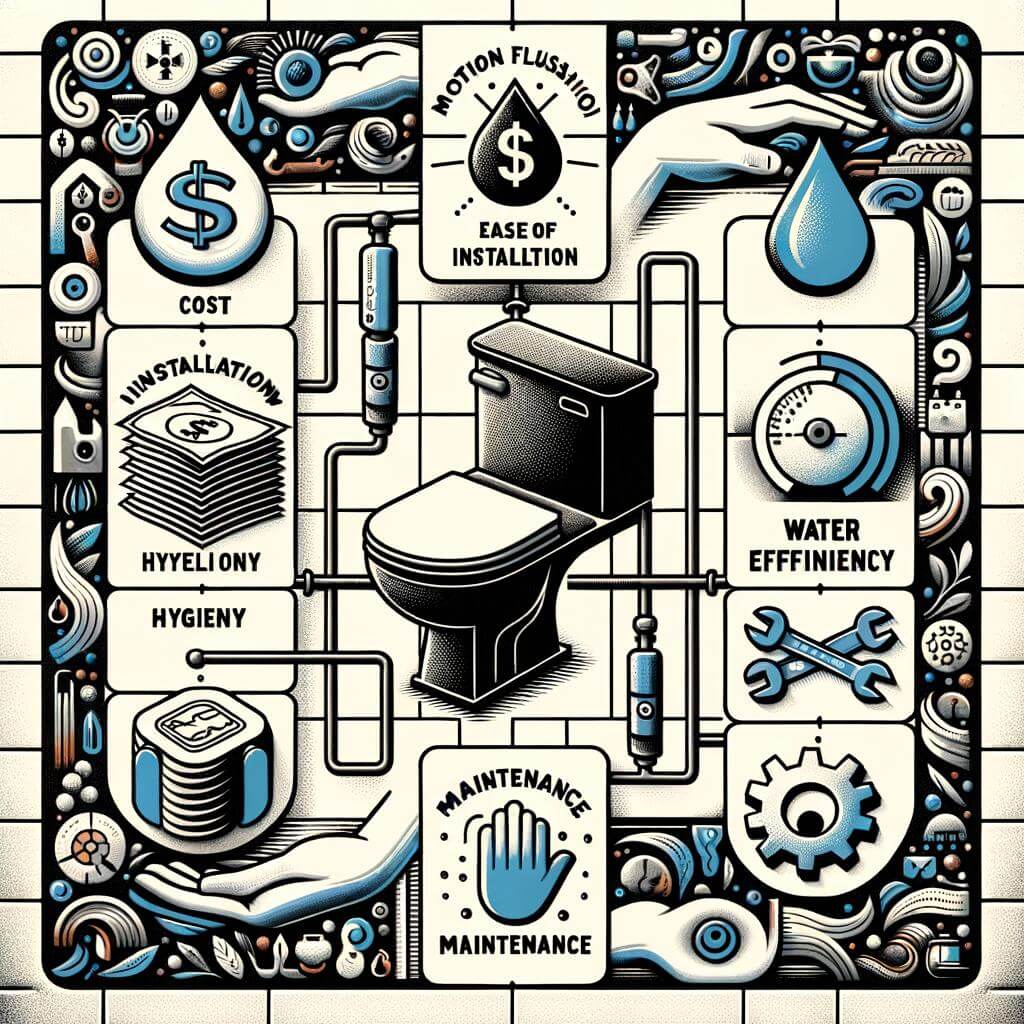Welcome! In this blog post, we delve into an important but often overlooked aspect of modern sanitation – Commercial Toilet Motion Flashing. Whether you’re considering updating your existing toilet set or exploring different options for a new home, this guide is a must-read! With a focus on how motion sensor toilets work, the benefits, and how to troubleshoot common issues, we hope to arm you with valuable information that could result in considerable savings in water usage and cost, improved hygiene, and overall ease of maintenance. Our experts share their best advice on how to understand and utilize this high-tech piece of household equipment, ensuring you make informed decisions for your home. This is an essential read for every homeowner who wants to stay updated with the latest home improvement technologies. Enjoy exploring and learning!
Understanding the Concept of Commercial Toilet Motion Flushing
Commercial restrooms utilize innovative technologies to improve hygiene and cleanliness standards, and a major player in this field is commercial toilet motion flushing. This system works using a sensor that detects motion and automatically triggers the flushing process. The greatest advantage of this system is the elimination of physical contact with the toilet. By automatically flushing, it promotes cleanliness and reduces the spread of bacteria and viruses. Moreover, it prevents unpleasant odors by ensuring each toilet is promptly flushed after use.
An important part of this system is the infrared sensor. This device detects infrared radiation, which all objects, including the human body, emit. When a person approaches the toilet, the sensor detects the change in infrared radiation and triggers the flush. However, the process doesn’t stop at detection, it also involves a timing element. If the sensor detects no motion for a predetermined period, it triggers the flush to ensure the toilet is clean for the next user.
Considered an advanced feature in commercial restrooms, most models allow adjustments to the sensitivity of the sensor and the delay of the flush. This ensures maximum effectiveness and efficiency, reducing water waste and maintaining cleanliness at all times.
Table showing the benefits of commercial toilet motion flushing
| Benefits | Description |
|---|---|
| Hygiene | These systems limit the spread of bacteria and viruses by eliminating physical contact with the toilet. |
| Efficiency | Automatic flush reduces the risk of unpleasant odors and ensures a clean toilet for each user. |
| Water Conservation | Motion flush toilets can control the amount of water per flush, reducing the amount of water used and wasted. |
Note: Some commercial restrooms also incorporate technology that allows for override flushing buttons. This provides the user with added convenience while maintaining control over flush timing if necessary.
Exploring the Benefits of Commercial Toilet Motion Flashing for Homeowners
The advent of technology in various aspects of our life has completely changed our daily routines. Commercial toilet motion flushing is one such innovation that brings several advantages to homeowners. Its benefits range from convenience to sustainability for the broader good of the environment.
Let’s take a moment to explore the benefits of the commercial toilet motion flushing.
- Hygiene: The primary benefit of a motion flushing system is hygiene. As the toilet is flushed automatically without having to touch any surface, it significantly reduces the chance of germ transmission. This is especially relevant in the current pandemic situation, where maintaining hygiene is paramount.
- Water Conservation: These sensors are designed not only for hygiene but also for water conservation. The technology can accurately measure how much water is required for each flush, reducing unnecessary waste and contributing to environmental sustainability.
- Cost-effectiveness and Maintenance: Motion flushing systems, while initially might appear costly, save money over time. Minimal contact means less damage and consequently reduced maintenance costs.
| Benefit | Description |
|---|---|
| Hygiene | Less germs transmission due to a no-touch system. |
| Water Conservation | Effective water management leading to reduced waste. |
| Cost-effectiveness | An initial investment that offers long-term monetary savings. |
Now, imagine a situation where you have guests over, and you don’t have to worry about whether or not all your guests remember to flush. With it, you get extra convenience in maintaining your bathroom without any extra fuss, thus providing your guests with a comfortable experience. This is how deploying a commercial toilet motion flushing system at home can transform the handling of sanitation at your place into a hassle-free task and pave the way for a cleaner, greener, and smarter domestic environment.
The Technical Perspective: How Motion Sensing Flush Systems Operate
Delving into the technicalities of motion-sensing flush systems, these advanced devices harness infrared technology to initiate flushing action. The central working component, the infrared sensor, is programmed to detect body heat. When you approach the lavatory, your body’s heat is sensed by the infrared sensor, setting off the pre-flush mechanism. This ensures the toilet bowl is fresh even before use. Post-use, the sensor triggers another flush once it no longer detects your body heat, thereby assuring complete hygiene and minimal water wastage.
The fascinating part of these ingenious systems lies in their adaptability and precision. They are designed to avert accidental flushes by distinguishing static heat sources from the dynamic heat of human presence. Moreover, the units tend to incorporate variable ‘sensing zones’ to detect both adult and young users. Let us delve into these components in detail:
- Infrared Sensor: The backbone of the system, these sensors capture infrared waves (body heat) and convert them into electrical signals for the flush mechanism.
- Microcontroller: It interprets the signals from the sensor and triggers the solenoid valve to either open or close based on whether the sensor detects body heat.
- Solenoid Valve: Works as a faucet, it opens to allow water into the toilet bowl when flushing is needed and shuts off once the flush is complete.
- Power Source: While some systems employ batteries, others tap into your electrical system. Energy-efficient models even harness the energy from flushing water to power themselves.
Understanding these components allows homeowners to better appreciate the sophistication of commercial toilet motion flushing systems, paving the way for better maintenance and advanced sanitation at home.

Making a Choice: Factors to Consider When Installing Motion Flush Systems
| Features | Requires consideration |
|---|---|
| Water-saving capabilities | Although they are designed to minimize water usage, particular models may offer more savings than others |
| Sensor reliability | Ensure the model you choose has a reliable sensor that effectively detects user movement |
| Installation requirements | Some can be a simple retrofit, while others demand more elaborate installations |
| Maintenance | These units have more working parts than a traditional toilet, hence potential for more breakdowns and need for upkeep |

Detailed Insights into the Maintenance and Troubleshooting of Toilet Motion Flushing Systems
Motion-flushing systems have provided an innovative solution to commercial and residential sanitation needs by increasing hygiene levels and saving water. Comprehending the mechanism of these automatic systems is essential to ensure their longevity and maximize their efficiency. Generally, these systems employ a sensor that responds to the user’s presence and automatically triggers the flush once the user departs.
Firstly, understanding the basic elements that form a motion-flushing system can be incredibly useful for any troubleshooting task. Typically, such a system incorporates a sensor module, a solenoid-controlled valve and a battery or power source.
- Sensor Module: This piece detects the user’s presence and sends a signal to trigger the flushing process once the user moves away.
- Solenoid-Controlled Valve: It’s a component that is electrically prompted to open or shut, controlling the water flow. When it receives the signal from the sensor module, it allows the water to gush out.
- Battery or Power Source: Motion-flushing systems are either powered by batteries or directly connected to the building’s electrical system.
Maintenance and troubleshooting of toilet motion flushing systems aren’t as arduous as they might seem. Here, we discuss some common issues and corresponding solutions.
| Problem | Solution |
|---|---|
| Inconsistent Flushing | Check and replace the battery if required. If the system is hard-wired, check electrical connections. |
| No Flushing | Test the sensor. If it doesn’t light up, replace it. Also, inspect the solenoid valve and replace it if faulty. |
| Involuntary Flushing | Check for objects that may block the sensor’s range and reposition the sensor. |
| Constant Flushing | This could be due to a stuck solenoid valve. Service or replace the valve. |
While professional care is always suggested for technical issues, understanding the basics and addressing minor snags can save time and avoid unnecessary expenses. Regular cleaning and timely battery changes can also prevent many of these common issues.
Expert Opinions and Recommendations: Enhancing Home Bathroom Experience with Motion Flushing Toilets
If you’re exploring ways to enhance your home bathroom experience, the integration of a motion flushing toilet system is an excellent consideration. These innovative devices, once only found in commercial settings, are now making their way into home bathrooms, providing a cleaner, touch-free experience, along with water conservation benefits. Commercial toilet motion flushing systems use sensor technology, eliminating the need for physical contact to flush the toilet and simultaneously reduce the spread of bacteria and viruses.
Before transitioning, it’s essential to understand a few major aspects. Functionality, compatibility, and costs should all be factored into your decision. Let’s dive in:
- Functionality: Most motion flushing toilets use advanced infrared sensors that detect movement, flushing automatically once the user steps away from the toilet. Some models feature manual override buttons for added convenience.
- Compatibility: It’s important to ensure that your bathroom’s plumbing system can accommodate the installation of a motion flushing toilet. Consult with a professional to avoid potential issues.
- Costs: While automatic toilets are more expensive initially, their durability and water efficiency can lead to potential savings over time.
It’s also valuable to consider various brands on the market. Some leading options include:
| Brand | Key Features |
|---|---|
| Kohler | Advanced cleanliness features, broad range of integrated technologies. |
| Toto | Leading in water-saving technologies, with a reputation for high durability. |
| Niagara | Affordable options without compromising performance, known for low water usage toilets. |
Ultimately, the decision to install a motion flushing toilet in your home could come down to your preferred level of convenience and hygiene, paired with practical considerations relating to cost and compatibility. Whatever your choice, this incredible technology is sure to modernize and enhance your bathroom experience.
Concluding Remarks
In conclusion, understanding the workings of commercial toilet motion-flushing systems can greatly contribute to their maintenance, longevity, and overall efficiency. This technology, while often associated with public and commercial settings, can also present viable benefits for homeowners in terms of sanitation, convenience, and water savings. Remember, keeping the systems in peak condition does not only entail regular checks, but, more importantly, creating an actionable and sensible maintenance plan.
It’s also crucial to remember that while the initial cost may seem high, the long-term returns from such an investment can be greatly beneficial. The important thing is to make informed decisions by knowing precisely what you’re dealing with, and this guide hopes to have shed some light on that.
Feel confident in your knowledge about commercial toilet motion-flushing systems and embrace a more efficient, water-saving future in your home. As ever, when in doubt, it is highly recommended to seek the expert advice from professionals. Good luck with your home improvements and maintenance endeavors. We’re always here to help when you need it.




